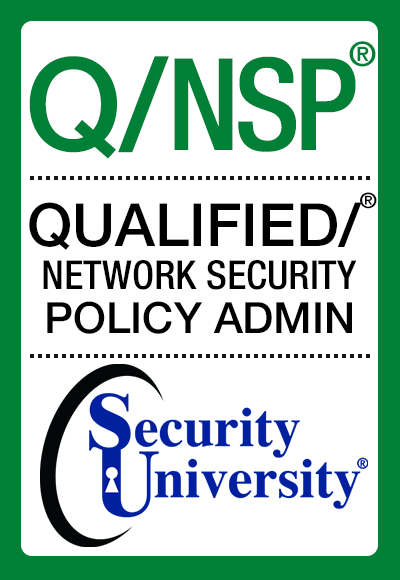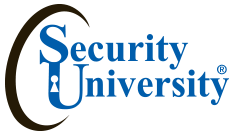 How to develop and implement security technologies, policies & strategies your organization needs
to raise your level of information security and assurance.
How to develop and implement security technologies, policies & strategies your organization needs
to raise your level of information security and assurance.
This 72 hour class provides a step by step way to take separate, diverse parts of your security technologies e.g., vulnerability penetration testing, anti-virus and incident response, certificates and network identity, firewalls, IDS (intrusion detection systems) and Forensics’ investigations together into a cohesive and effective security policy and awareness program. Learn how to build a program to reduce the Human Security gap in your company. Today's security policies need to build awareness of the potential problems while minimizing the cost of security incidents. Only if policies are well developed and accepted can you raise the level of information security awareness in your enterprise.
| Class Fee: | $3,990 |
| Time: | 72 hrs |
| Learning Level: | Entry |
| Contact Hours: | 40 hr 1 wk + 32 hr & 2hr exam |
| Prerequisites: | Understanding of TCP/IP Protocols |
| Credits: | 72 CPE / 3 CEU |
| Method of Delivery: | Residential (100% face-to-face) or Hybrid |
| Instructor: | TBD |
| Method of Evaluation: | 95 % attendance 2. 100 % completion of Lab |
| Grading: | Pass = Attendance+ labs & quizzes Fail > 95% Attendance |
Sample Job Titles:
Chief Information Officer (CIO)
Chief Information Security Officer (CISO)
Command Information Officer
Information Security Policy Analyst
Information Security Policy Manager
Policy Writer and Strategist
Who Should Attend
Strategic Planning and Policy Development - Applies technical and organizational knowledge to define an entity’s strategic direction, determine resource allocations, establish priorities, and identify programs or infrastructure required to achieve desired goals. Develops policy or advocates for policy change that will support new initiatives or required changes and enhancements.
This accelerated class is taught using face to face modality or hybrid modality [excluding veterans using the Veterans Education benefits, can only attend in the face to-face modality]. Class includes 72 hours of contact studies, labs, reading assignments and final exam - passing the final exam is a requirement for graduation.
Text Materials: labs, resource CD’s and attack handouts. Machines a Dual Core 24M Ram, 1TGig drives, running MS OS, linux, and VMWare Workstation.
KU outcomes:
- Students shall be able to list the applicable laws and policies related to cyber defense and describe the major components of each pertaining to the storage and transmission of data.
- Students shall be able to describe their responsibilities related to the handling of information about vulnerabilities.
- Students will be able to describe how the type of legal dispute (civil, criminal, private) affects the evidence used to resolve it.
Learning Objectives: After completing the polices it’s time to bring the whole network together and deliver a secure infrastructure. You’ll merge today’s security technologies into your network with the assurance that your layering defense tactics and providing early warning systems. Bring together the separate, tactical, diverse parts of your network with the services, mechanisms, and objects that reflect security policies, business functions, and technologies into a process involving risk assessment, policy, awareness, technology and security management, and audit functions. Building a security architecture involves close examination of current business processes, technical capability, information security documentation, and existing risk. Students will leave this class with a document template outlining a best practice for an information security architecture framework. When you’re through, you’ll have a comprehensive, roadmap understanding of the network security architecture.
Grades - All students must ordinarily take all quizzes, labs, final exam and submit the class practical in order to be eligible for a Q/ISP, Q/IAP, Q/SSE, or Q/WP credential unless granted an exception in writing by the President. A practical provides adequate evidence to support the claim of knowing something. However, what ultimately matters in this course is not so much where you end up relative to your classmates but where you end up relative to yourself in on Friday of class. The course is graded as a pass or fail solely on your attendance and participation. Those less comfortable and somewhere in between are not at a disadvantage vis-à-vis those more comfortable. Escalating labs help you prepare for real world scenarios. Each labs escalates upon itself, increasing in intensity, rising to the next level, while your mitigating the threat step by step.
Books - No books are required for this course. However, you may want to supplement your preparation for or review of some lectures with self-assigned readings relevant to those lectures' content from either of the books below. The first is intended for those inexperienced in (or less comfortable with the idea of) hacking. The second is intended for those experienced in (or more comfortable with the idea of) hacking. Both are available at sites like Amazon.com. Both are avail at the SU Hacker Library. Realize that free, if not superior, resources can be found on the SU website.



